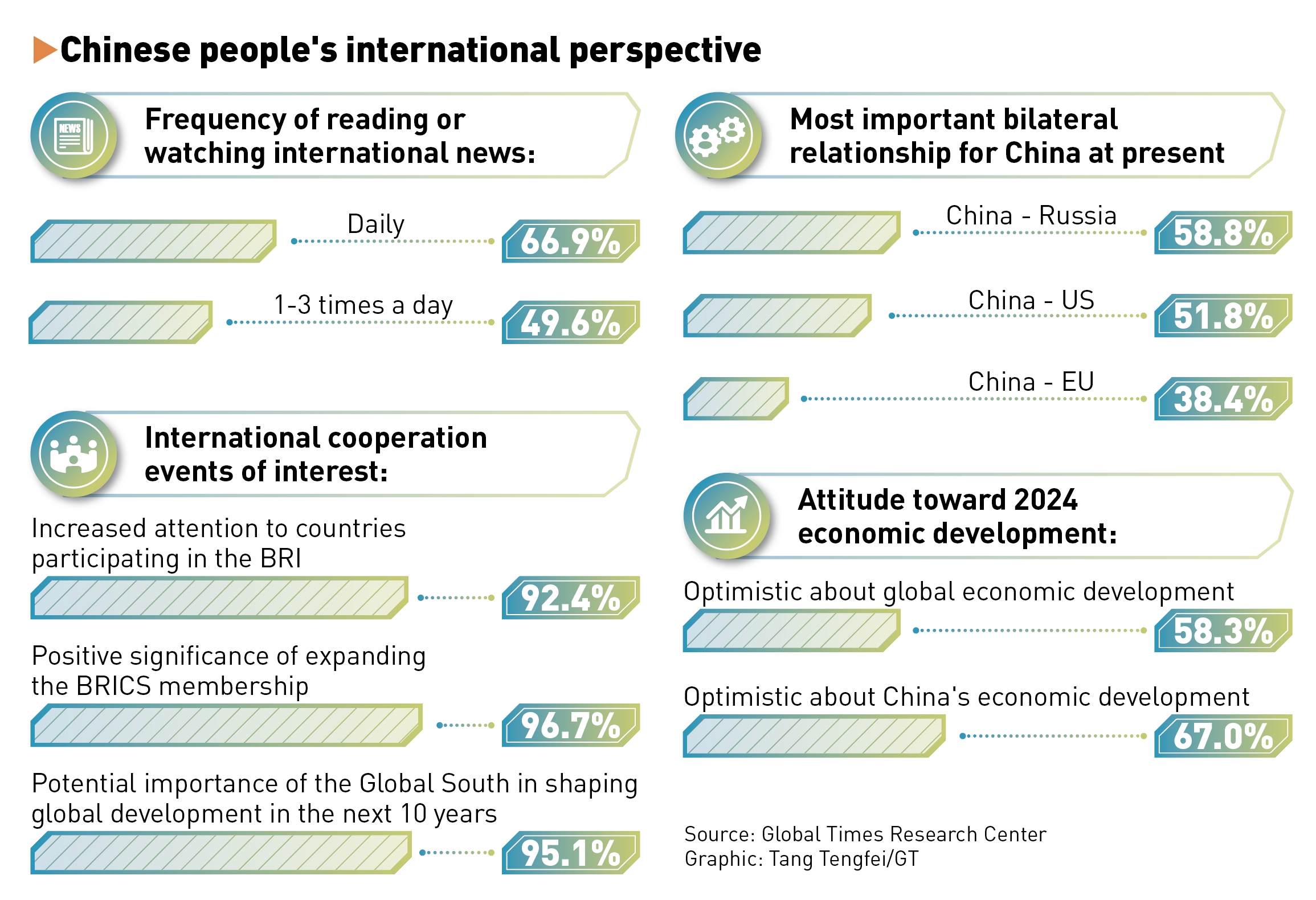Editor’s Note:
The year 2023 witnessed many changes in the international landscape and also saw more voices from the Global South on the global stage. It was also a year in which the US continued to forcefully impose its ideology on other countries, Japan’s nuclear-contaminated wastewater dumping was internationally condemned, and the Palestine-Israeli conflict broke out, all posing diverse risks to global peace and stability. Conversely, in 2023, China made great strides in economic recovery and diplomacy, and unveiled significant technological breakthroughs.
In this year full of uncertainties, what was the common people’s perspective on global issues? The Global Times Research Center recently conducted its 18th annual public opinion survey themed “How Chinese People View the World.” Based on the survey results, China-Russia relations were considered to be the most important neighboring relationship for the fifth consecutive year. At the same time, nearly 90 percent of respondents believe that the US lacks sincerity in improving China-US relations, and more than half of the respondents believe that China should retaliate against US sanctions and targeted moves.
This is the second installment of the survey.

Graphic:GT
China-Russia relations rank top
The survey mainly collected data through online questionnaires using member invitations, and was conducted from December 4 to December 15, 2023. The survey sample covered 16 cities in the seven major regions of the Chinese mainland. The survey targeted ordinary Chinese citizens aged between 18 and 69. A total of 1,897 valid questionnaires were collected.
In response to the question “Among the following bilateral relationships, which three do you think are the most important for China at the current stage?” 58.8 percent of respondents chose “China-Russia relations,” while “China-US relations” (51.8 percent) and “China-EU relations” (38.4 percent) ranked second and third respectively. China-Russia relations have ranked first for three consecutive years according to data.
In China’s neighboring relations, those with Russia have been the most important for respondents for five consecutive years. This time, with a mention rate of 66.1 percent, it has become the most important neighboring relationship among respondents.
Zhao Long, deputy director of the Institute for Global Governance Studies at Shanghai Institutes for International Studies, told the Global Times that multiple factors make the relationship between China and Russia the most important neighboring relationship in the eyes of the public.
First, China and Russia are each other’s largest neighbors, sharing a border that stretches 4,300 kilometers. The two countries have highly complementary economic structures, with China being Russia’s largest trading partner for 13 consecutive years. Bilateral trade increased from $8 billion in the year 2000 to over $200 billion in 2023. Second, China and Russia engage in strategic coordination on major international and regional issues. Finally, the high level of mutual trust and cooperation between China and Russia naturally extends to the promotion of people-to-people exchanges and cooperation, Zhao elaborated.
In the face of the current complex international situation, the high-quality strategic cooperation between China and Russia highlights the resilience, vitality, and value of the bilateral relations, which is why the public pays attention to the two neighbors’ relationship, he said.
In a previous exclusive interview with the Global Times, Russian Ambassador to China Igor Morgulov said that a shifting geopolitical landscape does not affect China-Russia mutual political trust.
“Under the strategic guidance of the leaders of our two countries, Russia-China relations have reached the highest level in history and have the nature of a comprehensive strategic partnership of coordination. The two sides have a high degree of mutual trust, respect each other’s interests, and carry out mutually beneficial and close cooperation in all fields. We are good neighbors. There is a Chinese proverb that goes, ‘A distant relative is not as good as a close neighbor.'” Morgulov told the Global Times.
Zhao told the Global Times that China and Russia are important forces in promoting a more multipolar world order and the democratization of international relations. The influence of China-Russia relations goes beyond the bilateral scope and is crucial to the world order and the future of humanity. The “global significance” of China-Russia relations can be understood multidimensionally through politics, security, and economy.
Politically, the two countries can jointly voice their support for international fairness and justice, strategically coordinate their positions on major international and regional issues, and propose plans and initiatives through multilateral platforms such as the United Nations Security Council. In terms of security, China and Russia emphasize the importance of breaking away from the constraints of a Cold War mentality, Zhao said.
Additionally, the survey found that 63.3 percent of respondents expressed a desire for the improvement of China-Australia relations in a separate question. Nearly half (49.7 percent) of all respondents expressed hope for a relatively close and friendly relationship between China and Australia, and 13.5 percent hoped for a very close and friendly relationship.
Chen Hong, executive director of the Asia Pacific Studies Centre at the East China Normal University, told the Global Times that the current China-Australia relationship is generally stable and shows signs of improvement. This is attributed to the meeting between the leaders of the two countries in Bali and the consensus reached during Australian Prime Minister Anthony Albanese’s visit to China in November 2023. Previous disputes between the two countries are gradually being resolved.
It is worth noting that 25.8 percent of respondents prefer for China-Australia relations to remain unchanged. Chen said that this also indicates the extent to which the Morrison administration damaged China-Australia relations in the past.
However, overall, Chinese people generally believe that the relationship between China and Australia should not become confrontational. Australia must fully recognize its importance in the eyes of the Chinese people and cherish the hard-won friendly relationship, he said.
When compared with the softening tone in China-Australia relations, the survey found that due to the recent provocative actions of the Philippines in the South China Sea that violated international law, 40.6 percent of respondents expressed support for communication and cooperation with the Philippines to ease tensions in the South China Sea, while some 30.3 percent of respondents support taking more or stronger actions against the Philippines. Nearly a quarter of respondents said they supported maintaining the status quo.
Chen said that the Chinese government’s advocacy for resolving disputes through dialogue and consultation is in line with public opinion. However, if the Philippines persists in its unilateral actions, China will resolutely defend its rights in accordance with the law.
US lacks sincerity in improving ties
In the survey, multiple questions were set regarding the China-US ties.
The survey result showed that 63.1 percent of the respondents expressed an unfavorable attitude toward the Biden administration. More than half of the respondents also held a negative view toward Republican and Democratic politicians at 55.3 percent and 53 percent respectively. The proportion of respondents who dislike the Biden administration increased by 3.3 percentage points compared with 2022. The percentage of respondents who dislike the American media reached 43.9 percent, an increase of 5.6 percentage points year-on-year, and the likeability rate was also less than 10 percent.
In recent years, the Biden administration has treated China as a strategic competitor and imposed restrictions on China in various areas such as technology and the economy. In this survey, 51.4 percent of the respondents believe that China should retaliate against the US. Nearly 90 percent of respondents expressed they believe that the US lacks sincerity in improving China-US relations.
Conversely, respondents still had a relatively favorable view of American film and television productions (48.5 percent) and sports leagues (41.9 percent), but both experienced a decrease in favorability of 11.2 and 8.6 percentage points respectively year-on-year.
Qiang Ge, professor at the National Academy of Governance, told the Global Times that the Chinese public has a negative view of Biden administration and the two parties in the US mainly because the US has repeatedly unjustifiably suppressed and demonized China in recent years.
However, many Chinese people still enjoy American sports and film and television products, which precisely shows that the Chinese people do not dislike the country, but rather the American political arena has destroyed goodwill among the Chinese people toward the US. The decline in favorability, to some extent, indicates that people’s aversion to American politics has affected their perception of American culture, Qiang said.
The survey showed that when asked about their views on American democracy, freedom, and human rights in recent years, over three-quarters of respondents expressed a lack of support or a decrease of the same, an overall increase of 5.3 percentage points year-on-year. Regarding the performance of the US in the current Palestinian-Israeli conflict, 55.4 percent of the respondents said they believe it is irresponsible, 42.4 percent believe it is unethical, 38.9 percent believe it is unfair, and 36.4 percent believe that the US is hindering an early resolution to the Palestinian-Israeli conflict.
Sun Degang, director of the Center for Middle Eastern Studies at Fudan University, told Global Times that this poll result sends several signals: First, as the so-called hegemonic power in the Middle East, the US has not provided a good solution to the Palestinian-Israeli conflict, so Chinese respondents feel that the US lacks the ability. Second, civilians in the Gaza Strip are facing a serious humanitarian crisis, but the US continues to exercise its veto power in the United Nations Security Council, providing more time for Israel’s military offensive. This reflects US’ double standards. Finally, the US stands in opposition to world peace, as indicated by its policy-making that is still driven by self-interest, which will continue to diminish its global appeal, influence, and discourse power.
China actively promotes open, inclusive global cooperation
The “China’s International Perspective” section of the survey reveals the Chinese public’s views on the international situation. According to the survey data, 66.9 percent of respondents stated that they watch, read, or listen to international news daily, with 49.6 percent of respondents reporting a frequency of “1-3 times per day” in their exposure to international news.
Li Long, vice president of the Institute of Public Opinion and Social Governance at South China Normal University, told the Global Times that an increase in international news consumption reflects the increasing international vision of the Chinese people.
Currently, Chinese people are paying more attention to China’s role and influence in international affairs. According to the survey, 92.4 percent of respondents believe that the Belt and Road Initiative (BRI) has increased attention paid to countries which participated in the initiative.
“The support of the Chinese people for their country’s foreign policy helps to strengthen China’s cooperative relationship with the countries participating in the BRI. It also enables the government to focus on the needs and opinions of the public while promoting fair and sustainable development in bilateral cooperation,” said Li.
At the same time, 96.7 percent of the respondents agreed that the increase in the BRICS countries has a positive significance. In August 2023, during the 15th BRICS Summit, it was announced that Egypt, Ethiopia, Iran, Saudi Arabia, and the United Arab Emirates had been invited to join the BRICS cooperation mechanism. Their membership took effect on January 1.
Feng Xingke, secretary general of the World Financial Forum and director of the Center for BRICS and Global Governance, told the Global Times that the reason why the respondents were optimistic about the expansion of BRICS is mainly due to the continuous attempts by the US and the West to foment conflict to contain China’s development, which has caused strong resentment among the Chinese people.
“The BRICS mechanism, on the other hand, despite its different national conditions, systems, and cultures, upholds the spirit of mutual respect and understanding, equality, solidarity, openness, inclusiveness, and consensus. The spirit of win-win cooperation has kept this mechanism alive and benefited every country in it,” Feng said.
The expansion of the BRICS countries will also further deepen the new type of globalization, experts pointed out, noting that the expansion process of the BRICS through including more countries has further strengthened the voice of the Global South. At a rate of 95.1 percent, respondents believe that the Global South may become an important force influencing the global development pattern in the next 10 years.
Currently, the global economy is stumbling forward and facing challenges. When asked about their expectations for the global economy over the next year, 58.3 percent of respondents were relatively optimistic, an overall increase of 6.7 percentage points compared with 2022. It is worth noting that 67.0 percent of respondents hold an optimistic attitude toward the future development of the Chinese economy in the next year, with 22.0 percent considering themselves to be “very optimistic” while 45.0 percent are “relatively optimistic.”
He Zili, professor at the School of Economics at Nankai University, told the Global Times that China implemented a series of measures to stabilize the economy in the last year, achieving significant results, which is an important reason for the increased confidence in the respondents.
“The position of the Chinese economy in the global economy is becoming increasingly important. Therefore, as long as the Chinese economy continues to recover and improve, there will be more stability in the global economy,” He said.
He pointed out that the digital economy and the intelligent transformation of traditional manufacturing will be the key areas for China’s economic focus in the future. According to the survey results, 73.6 percent of respondents expect foreign-funded enterprises to play a role in China’s economic development, and foreign-funded enterprises in the health, energy, infrastructure, ecological protection, and new energy vehicle industries are seen as having good prospects in China.
China has a huge market demand and policy support in these industries, making it highly attractive to multinational companies. Looking ahead, China will create a better business environment to promote the quality and level of foreign investment utilization in our country, He said.













